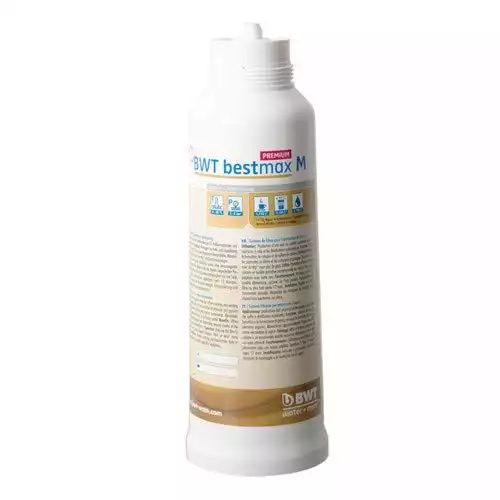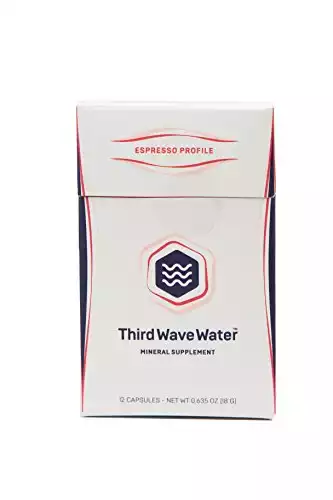What’s The Best Water For Coffee?
It’s common to focus on beans and equipment when it comes to brewing coffee better. But when you think about it, we spend so much time focusing blindly on 2% of what’s in our brew.
The other 98%? Is pure water.
Let’s take a closer look at the best water for coffee and how picking the right type can make a difference to the taste.
Good Water Not Any Water
One of the most surprising bits of information I got as a new barista was listening to a current, and former local barista champion discuss how water was more important than coffee machines, burr grinders, and beans.
They touched on how hard water could be bad for your machine, how sweet spring water could sometimes be, and how the tap water in their respective coffee shops was ideal for espresso.
Not All Bottled Water Is For Coffee
Water is essential for life. Our bodies (over 60%) are mostly made up of it. Our organs use it to function correctly. So we drink it daily (I hope).
We drink so much water that we often forget to actually slow down and taste it.
People usually look at me like a lunatic when I claim that tap water tastes a lot different than distilled water. Or that spring water is sweet compared to “purified” or pure water. Sometimes certain bottled water brands are more refreshing to drink after a run under the hot sun. Others have a weird taste when they aren’t cold.
If you have enough time and a lot of curiosity, the fastest way to prove which is best is to taste various bottled water brands. Even before using them for coffee, try all of them side by side. You can do this alone or even with a group to see how easy or difficult it is to perceive the taste difference.
This is one of my taste training modules as a barista trainer. It’s entertaining to watch trainees’ eyes light up when they taste what I describe, and later on, how we compare espressos brewed with different types of water.
Is it OK to use distilled water to make coffee?
Definitely not. Using distilled water for coffee on its own isn’t going to work well.
Why?
Because minerals carry the flavors from the bean to the coffee in your water.
Magnesium and calcium to be exact. Magnesium helps carry fruity notes, while calcium extracts creamy notes. Now you see directly how low mineral content can negatively affect your coffee.
It’s also probable that if a particular coffee bean origin is known for fruity flavors, that your ideal water composition for it might be different from an origin with creamy, chocolatey notes.
Have you ever had a cup of coffee brewed with distilled water? The taste is flat and lifeless. Devoid of minerals and any pleasant flavors. Definitely not how coffee was intended to taste. It’s confusing to calibrate as a barista, and as a customer, it’s not something you feel good about paying for.
Nonetheless, if you want a machine to distill the water before adding in the minerals yourself at home, it’s easy to do and highly reccomended if you want to go down the mineral sachet route.
Compounds of your brewing water will have a more significant effect on the quality of your cup of coffee, down to its pH level. Moreso than any piece of equipment.
Water will impact your coffee much more overall than your chosen brewing method. When it comes to espresso, Mineral content is more critical than your espresso machine brand or machine. A good burr grinder will not remedy hard water or chlorine-bombarded tap water either.
Conversely, sweet spring water might work well with your light or medium roast coffee. It’s really getting to know the minerals in your water that will help elevate your coffee. Thankfully, some bottled coffee variants contain an acceptable range, or you can create a completely blank canvas with distilled water (and add minerals yourself – I’ll cover how shortly).
Distilled or reverse osmosis water is a type of water that has no minerals and contaminants. It’s purified to a point where it’s completely flat. There are zero minerals to carry the coffee’s flavors to your cup.
Test this out next time you brew. Make one coffee with mineral water and another with distilled water. Coffee flavors will be more pronounced with the former rather than the latter. Even the body will be better!
What is the most ideal type of water for coffee?
Believe it or not, the coffee industry is so advanced these days that professional-caliber equipment is available for home use. We have thermometers, refractometers (for TDS), and so many other types of options to help even the most casual home brewer “level up”.
Yes, even water that is made ideal for coffee is now available. Via filters or mineralization packets.
There are bottled water options that are good enough for coffee. There are also companies built around providing the best water solutions tailor-made for coffee businesses. However, the step below is to just bring your water at home to a mix that’s closer to ideal for coffee lovers like yourself.
The best way to start is with a blank slate. In water’s case, it’s with distilled or reverse osmosis water. Tap water has minerals in it, to begin with, so it’s not always suitable as a base for mineralizing your coffee water. Unless you’re willing to test the minerals in your tap water and add any of the missing minerals into your water.
Again, you don’t want to be using hard water in your machines. Hard water will speed up limescale build-up, which affects the taste and shortens your equipment’s life overall.
It’s better to be safe than sorry when it comes to the size of investment in a coffee shop, so why not start with your water? Choosing to use bottled distilled water as a base is an excellent first step.
Once you secure your distilled water source, it becomes a matter of selecting your supplier for minerals.
See below for a rough guide of what you should look for. But, keeping a journal and trying different concentrations is the best way to find the ideal level of calcium and magnesium, as well as the perfect pH you need. There will be variations depending on what beans you use and what you brew with.
Some water companies even have remineralization packets specifically made for roast profiles and brew methods. It’s that precise!
Find this process too tedious for your brewing pleasure?
There are good-enough store-bought bottled water options. Just remember that when it comes to best coffee brewing practices, look at the mineral content of your water label and select accordingly.
You can even regularly compare different water brands as you brew. You’ll be surprised at how different they all are. Even the same type of water can be miles apart in terms of TDS (total dissolved solids)!
If you want to get started on the right foot, Volvic is always a good choice. This type of water tastes sweet and heavy to me. They maintain a TDS range of 100-150. This basically is a measure of minerals in your water. From this measure, you can also glean information on how much of other compounds make up your water.
You will need a clear understanding of this to see how it affects your coffee’s body and unmistakable flavors.
The ‘Best’ Water Depends On Brewing Method
Since the espresso machine is essentially one big water heater, we tend to overlook the need to filter the water that runs through it. City tap water can have a TDS of 10-100, depending on the location and treatments on it. This is a good reason to test your water before you begin brewing. At home or in a commercial setting.
I’ve previously worked in a shop with water that was too hard, and we kept replacing our filters weekly. Even with proper machine resetting and backflushing, the limescale build-up needed servicing in half the time it was usually required to do so.
Back then, the cafe was unprepared for an unexpected malfunction, and so operations had to be shut down for a couple of days. Imagine the effects of this on operations, revenue, and customer satisfaction. All because of water!
My experience with water that was too soft, on the other hand, was more confusing and a bit less costly. But it’s still far from ideal. As I was calibrating espresso for an event, I couldn’t seem to nail it like I did that morning in the coffee shop.
By the time I realized that someone had plugged in distilled water, I had pulled 7 calibration shots and called our roaster to ask if he changed our blend’s profile! That’s when I realized that there is no way to make coffee taste great with bad water.
As you can see, to maximize the use of your coffee machine, you’ll need to make sure that the water running through it falls within ideal parameters.
It can’t be too acidic or alkaline because it can also corrode your espresso machine or cause you to produce bad coffee. In some cases, you can even match it up perfectly to your origin and roast level. If it fits your concept and budget.
A quicker solution is to use bottled water with the right amounts of minerals. But a comprehensive solution is just to start making your own.
Use it to deepen your coffee knowledge of brewing principles. Though, I have to say that in a few instances, the tap water of coffee shops or houses that I’ve tested fell under ideal parameters. It’s always best to test initially, so you know how to adjust your water perfectly.
Manual coffee brewing, on the other hand, is a bit more flexible than espresso. This is rooted in the fact that you use less water in general. You won’t have to buy huge amounts of certain water types, and you get to taste different types of bottled water easier with your hand-brewed coffee.
Also, since water heating occurs outside of the brewer, it removes the limescale headache from your brewing equipment.
However, as with all coffee equipment, it’s best to clean regularly right after brewing (yes, before you enjoy your cup of joe). But also familiarize yourself enough to know when something needs a deep clean or even replacement.
The Best Water For Coffee
Since we mentioned water for espresso machines and water for manual brewing coffee above, here are a couple of ideal options for each!
You might end up using a slightly different kind of water for each, so these next 2 picks are safe and writer-approved!
1. BWT Bestmax Premium
This premium filter is great for coffee shops that are still in the equipment-purchasing stage.
PROS (+)
- Has limescale protection
- Mineralization for optimum magnesium content for better coffee extraction
- Easy installation
- Space-saving design
CONS (-)
- Additional installation vs plug and play store-bought mineral water options
- Lifespan depends on the quality of tap water as well
I recommend investing in filtration systems 10/10 times because of their overall effect on coffee quality and coffee machine longevity. Make sure to test what kind of water you have from the tap, so you also know what you’re dealing with.
You remember those small cafes with amazing long blacks and espresso?
Their edge is probably their water. Whether by design or naturally good, most people will attribute a good shot to the machine or the beans. Not ideal mineral water.
The alternative to this is reverse osmosis or RO water.
2. Third Wave Water
PROS (+)
- Customizable profile to suit your coffee preferences
- Adjustable batch sizes to make sure your coffee water is always fresh
- Adds another fun but educational aspect into coffee brewing at home or in your coffee shop
- Great baseline for ideal water for brewing coffee
CONS (-)
- Not the most accessible piece of better coffee brewing equipment
- Pricier than its bottled water counterparts
The most significant downsides to using Third Wave Water are rooted in price and accessibility.
Everything else about Third Wave water will help improve the taste of your cup of coffee. It’s the absolute best type of water, in my opinion, and is worth the price it’s sold at. It’s simple to use with distilled water.
While it’ll go perfectly with your favorite pour-over coffee maker, it’ll also work with single-serve coffee makers. Keurig machines will literally be thanking this water for coffee.
Conversely, if you use distilled water in Keurig machines, expect faster corrosion due to the combined water composition and water temperature.
Coffee Water Recipe
So maybe you want to get an idea of what the best water for coffee tastes like, but you don’t want to buy any of these kits just yet.
Is there a way to make third wave water at home so that you can try it with your coffee? Distilled water is usually the first step, but yes, this is absolutely possible!
Here is a quick recipe. It’s taken from a post in Barista Hustle, one of my favorite resources for coffee.
They’ve even included a calculator if you want to begin with tap water that’s easily accessible to you. Ideally, you need to taste and test for the KH (Carbonate Hardness) and GH (General Hardness).
You will need a mix of the following solutions for your DIY coffee water:
- A Buffer Solution
- A Hardness Solution
- Deionized or distilled water
For these solutions, you will need:
- Baking soda
- Epsom salts
- Deionized or distilled water
- Digital scales (accurate up to 0.01g)
- 3 x 1L containers that are food grade and odorless
For the exact water recipes, you’d like to emulate, see the full article for yourself. There’s even a calculator included so you can adjust the components of your tap water. Sometimes you’ll end up going from soft water to hard water, or vice versa.
This may seem like a lot of work, and some terms may seem confusing. But if you gather the patience to understand the terminology, I will end by saying that this relatively low-cost experiment is worth the results. And deeper understanding of this essential element of brewing coffee.
Summary
With this article, I hope to have shared a basic understanding of how vital water is in coffee, in the same way that other baristas paved the way for me to deepen my knowledge of coffee.
The ideal water for coffee is really just one of those things that you have to taste to grasp completely. Enjoy the process, and keep brewing!




